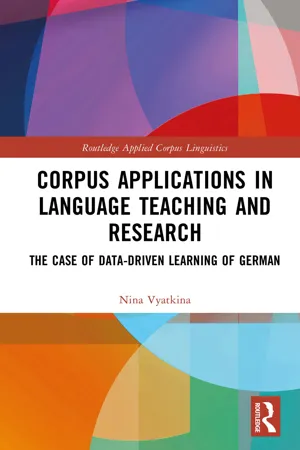
Corpus Applications in Language Teaching and Research
The Case of Data-Driven Learning of German
- 192 pages
- English
- ePUB (mobile friendly)
- Available on iOS & Android
Corpus Applications in Language Teaching and Research
The Case of Data-Driven Learning of German
About this book
Corpus Applications in Language Teaching and Research: The Case of Data-Driven Learning of German provides a historical overview of corpus applications in language teaching with a focus on German. The book identifies challenges in using corpus applications and data-driven learning (DDL) research for Languages Other Than English (LOTEs) and addresses these challenges through various approaches. Overall, this book:
- surveys corpus applications for teaching and learning German, highlighting the growth of the L2 German DDL field and identifying trends in integrating DDL into pedagogical practice;
- presents empirical research on the effectiveness of DDL applications for teaching and learning German in comparison with research on English and other LOTEs, emphasizing the need for expanding the scope of DDL research to include more languages, skills, and study types;
- compares teaching interventions for L2 collocations in the fields of Instructed Second Language Acquisition (ISLA) and DDL, highlighting methodological differences between the two paradigms and proposing a combined ISLA/DDL framework to bridge the disconnect;
- showcases a successful DDL intervention that resulted in significant learning gains in German collocation knowledge, filling a gap in DDL research;
- proposes an Open Educational Resource (OER) for teaching and learning German, incorporating open access corpora, learner-fit criteria, new tools and technology, and usage-based learning principles;
- examines the current difficulties encountered by the DDL field and highlights potential directions for future research and pedagogical approaches.
This book offers insights and resources for researchers, language teaching practitioners, and students interested in corpus-based learning and teaching methods. While the focus is on teaching German to English-speaking students, the book's findings have broader applicability to language teaching and learning in different contexts.
Frequently asked questions
- Essential is ideal for learners and professionals who enjoy exploring a wide range of subjects. Access the Essential Library with 800,000+ trusted titles and best-sellers across business, personal growth, and the humanities. Includes unlimited reading time and Standard Read Aloud voice.
- Complete: Perfect for advanced learners and researchers needing full, unrestricted access. Unlock 1.4M+ books across hundreds of subjects, including academic and specialized titles. The Complete Plan also includes advanced features like Premium Read Aloud and Research Assistant.
Please note we cannot support devices running on iOS 13 and Android 7 or earlier. Learn more about using the app.
Information
Table of contents
- Cover
- Endorsement page
- Half Title
- Series Page
- Title Page
- Copyright Page
- Table of Contents
- List of figures
- List of tables
- Foreword
- Acknowledgments
- 1 Introduction
- 2 Corpus applications in L2 German teaching
- 3 Empirical studies on the effectiveness of DDL for German
- 4 Comparative methodological synthesis of ISLA and DDL research on L2 collocations
- 5 DDL effectiveness for the improvement of the L2 vocabulary knowledge: The case of German verb–noun collocations
- 6 Materials design: Development of Open Educational Resources and Practices for DDL of German
- 7 Conclusions and outlook for DDL of German and beyond
- Appendix A: Top 50 keywords in the ISLA articles subset
- Appendix B: Top 50 keywords in the DDL articles subset
- Appendix C: Language background questionnaire
- Appendix D: Verb–noun collocations on paper: worksheet
- Appendix E: Verb–noun collocations on computer: worksheet
- Appendix F: Collocation knowledge test part I
- Appendix G: Collocation knowledge test part II
- Index